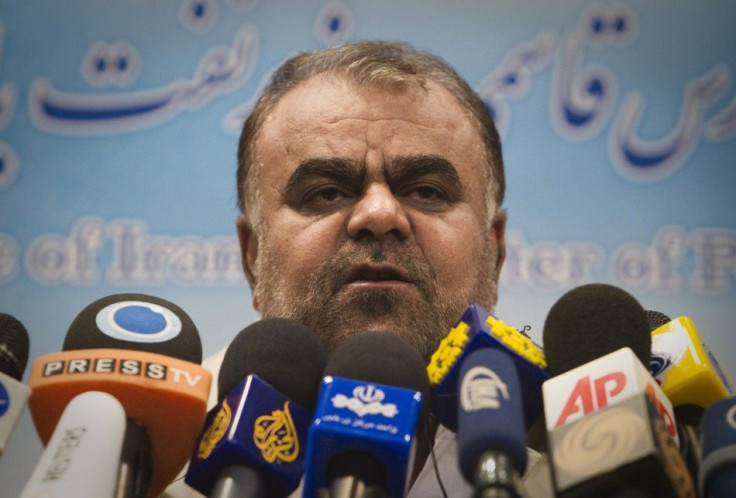Iran Remains Defiant, Despite Sting Of Western Sanctions

The Iranian Oil Minister admitted on Monday that Western sanctions on the Iranian oil industry have taken a drastic toll, the Iranian Student News Agency reported. Exports have fallen by 40 percent in the last nine months, Oil Minister Rostam Qasemi admitted, after spending months denying that the sanctions were having any effect at all.
He also admitted there has been a 45 percent decrease in repatriated oil money, and that total revenues for the year, ending in March 2013, would also show “a significant decrease.”
Qasemi’s admission that Iran’s finances are being affected by Western sanctions makes him the latest in a small string of Iranian ministers who are breaking ranks with President Mahmoud Ahmadinejad’s party line that the sanctions have had no effect.
In December, Economic Minister Shamseddin Hosseini admitted that Iran “is facing a 50 percent drop in its oil revenues due to sanctions,” Agence France Presse reported. And just before New Year’s Eve, Iran’s Health Minister, Marzieh Vahid Dastjerdi, was let go from her post ostensibly for publicly criticizing the administration for inappropriately budgeting Iran’s finances while prices of medicines keep climbing.
Exports of Iranian crude oil have fallen from 2.4 million barrels per day at the end of 2011 to 1 million barrels per day at the end of 2012, the Organization of Petroleum Exporting Countries and International Energy Agency told Business Insider. OPEC also reported that Iran has slipped from its status as the second-biggest oil exporter to fourth, behind Saudi Arabia, Iraq and Kuwait.
The sanctions, imposed mostly by the U.S. and EU, are aimed at curtailing Iran’s burgeoning nuclear program. The U.S. sanctions, as specified by the Treasury Department, prohibit any new financial interactions with Iran by U.S. persons or companies, and prohibit all Americans from trading in Iranian oil or petroleum products, or performing services for those industries.
The EU sanctions imposed similar restrictions as well, including the disconnection of Iranian banks from the Society for Worldwide Interbank Financial Telecommunication (SWIFT), a financial communication and clearing system that is used by most of the world's major banking institutions.
The sanctions have effectively jettisoned all of Iran’s Western customers; the only ones left are in Asia. As of the end of 2012, China, South Korea, Japan and India were the biggest consumers of Iranian oil, a new report from the Economist’s Intelligence Unit reveals.
And India may not be on board much longer: In December the Delhi government leaked that they plan to decrease Iranian imports by 10 percent to 15 percent by 2014.
South Korea and Japan, both of which have closer political ties to the U.S. than to China, also cut their consumption of Iranian oil in 2012, the Middle East business paper BEDigest said, and seem set to cut them even further, the Economist reported.
Oil exports are the biggest pillar of the Iranian economy. In previous years revenue from oil exports has covered between 50 percent and 60 percent of the government’s budget. The loss of oil revenue will mean that Iran has even less money to cover its expenses in the coming year.
However, despite the seeming victory for the West, the sanctions have yet to have their intended effect: that is to halt Iran’s nuclear development. Unfortunately, short of a military intervention, there is little else the West can do, as the English-language Tehran Times pointed out.
Oil Minister Qasemi told the paper on Friday that “… the imposers of sanctions have no more aces up their sleeves to [increase] pressure on Iran’s oil industry.”
And Iran may have a new rising ally: Turkey.
The state-run FARS news agency reported over the weekend that oil exports to Turkey remained steady despite pressure from the U.S. On Saturday, the Turkish Economy Minister Safer Caglayan told reporters that “another’s sanctions don’t concern me,” referring to the EU sanctions, and vowed that Turkey will continue to purchase gas from Iran despite EU pressure.
The Journal of Turkish Weekly reported that Turkey imports between 2.1 million and 3.1 trillion gallons of gas from Iran every year.
© Copyright IBTimes 2025. All rights reserved.






















